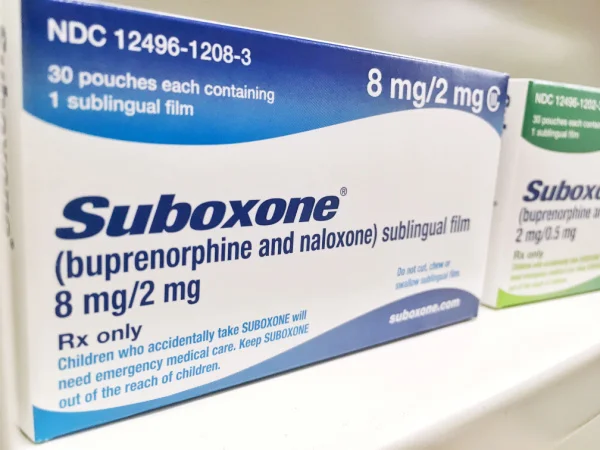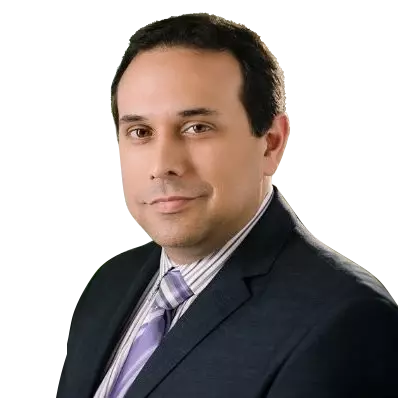Suboxone Addiction: Symptoms, Treatment, and FAQs
Suboxone is a common treatment medication used in conjunction with behavioral therapy and counseling to help people recover from opioid use disorder (OUD) or opioid misuse.
While Suboxone can be a valuable part of a comprehensive treatment plan, there is potential for Suboxone addiction, side effects, or adverse health effects. However, when taken as directed, Suboxone is known to be safe and effective at helping people struggling with OUD.
Read on to learn more about the signs and symptoms of Suboxone addiction, along with treatment options.
What Is Suboxone?
Suboxone is the brand name for an FDA-approved treatment medication used to treat OUD. It comes in a sublingual form that is put under the tongue or inside the cheek.
Suboxone combines two types of medication to ease withdrawal symptoms while reducing opioid cravings:
- Buprenorphine: A partial opioid agonist that partially activates opioid receptors in a person’s brain to help ease uncomfortable withdrawal symptoms and reduce cravings for opioids.
- Naloxone: An opioid antagonist that blocks activity in opioid receptors to blunt or prevent the euphoric effects associated with opioid misuse. It also helps reduce opioid cravings. Naloxone on its own can be used to reverse an opioid overdose as a nasal spray or injection.
As part of a comprehensive treatment plan, Suboxone can help a person recover from opioid addiction.
Is Suboxone Addictive?

Suboxone can be addictive and misused. Suboxone addiction occurs when a person demonstrates compulsive drug-seeking behaviors even when they experience consequences related to their drug use.
The presence of buprenorphine, which is a schedule III controlled substance and narcotic, means it has the potential for misuse in the same way as illicit opioids (like heroin).
But how common is it for Suboxone users to become addicted to it?
Psychiatric mental health nurse practitioner (PMHNP) Valerie Puffenberger says, “When taken as prescribed, there is a minimal risk of developing an addiction to Suboxone. As with many prescription medications, your body can develop a physical dependence on it, which is not the same thing as addiction.”
Puffenberger explains that “Suboxone also has a ‘ceiling effect,’ which means a person will not experience stronger effects after a certain dosage point.”
As such, those using it without proper oversight are more susceptible to misuse.
“Suboxone is highly misused by those who are taking it without a prescription and/or without undergoing treatment to relieve opioid withdrawal,” Puffenberger says.
Schedule III substances have less potential for misuse than schedule I and II substances like oxycodone and methadone; however, people should only take Suboxone under the supervision of a doctor to help prevent misuse or Suboxone addiction.
Signs of Suboxone Addiction
The diagnostic term for Suboxone addiction is opioid use disorder (OUD). OUD develops after compulsive opioid use, which causes long-lasting changes in the brain and results in continuous drug-seeking behaviors.
Opioid use disorder can only be diagnosed by medical professionals after conducting a comprehensive evaluation.
The Diagnostic and Statistical Manual of Mental Disorders, 5th edition, outlines the diagnostic criteria for OUD and can help people with opioid or Suboxone addiction know when it’s time to get help. If you’ve experienced two or more of the following criteria over the past 12 months, you may consider getting Suboxone addiction treatment:
- You use more opioids or for longer periods than you originally intended.
- Attempts to stop taking opioids or cut back on using them are unsuccessful.
- You spend excessive time, money, or resources on getting opioids, using them, or recovering from using opioids.
- You experience strong cravings to use opioids.
- Your use of opioids prevents you from fulfilling your obligations to your family, work, or school.
- Opioid use continues even though it leads to conflicts in your relationships.
- You give up hobbies or things you enjoy in order to use opioids.
- You take opioids in situations that could be dangerous, like driving.
- You continue using opioids even though it’s worsening a medical or psychological condition.
- You develop a tolerance to opioids and end up taking more to feel the effects.
- You experience withdrawal symptoms if you stop using opioids or must keep using opioids to avoid withdrawal.
If you think you or your loved one could be addicted to Suboxone, PMNHP Puffenberger says, “The true, long-term solution for opioid addiction is recovery.”
Legacy is here to help you on your road to recovery and long-term sobriety.
Can You Overdose on Suboxone?
Yes, it is possible to overdose on Suboxone. It contains the opioid buprenorphine, which is a partial opioid agonist, meaning it can produce some of the euphoric effects of opioids, but with less intensity.
It’s important to note that Buprenorphine is known to be a safe option during OUD recovery since there is a limit to its effects. Opioids can cause respiratory depression, but those effects won’t be as intense with buprenorphine. This can lower the potential for an opioid overdose.
An opioid overdose occurs when a person takes enough of an opioid to overwhelm their system resulting in side effects that can be life-threatening. Signs of an opioid overdose include:
- Small, constricted “pinpoint pupils.”
- Sleepiness or loss of consciousness.
- Slow, shallow breathing.
- Choking or gurgling sounds.
- Limp body.
- Pale, blue, or cold skin.
If you or someone you know is experiencing an opioid overdose, call 9-1-1 immediately.
Suboxone Addiction Treatment Options

While people can develop a Suboxone addiction, Suboxone is not typically known as a substance of misuse, but as a treatment medication. Treatment for substance use disorders (SUDs) like opioid addiction, including Suboxone, should be tailored to meet a person’s individual needs.
Opioid addiction treatment will typically involve both behavioral therapy and treatment medication. This combination of treatments is sometimes referred to as medication-assisted treatment (MAT). A common behavioral therapy used to treat people with OUD is cognitive behavioral therapy (CBT), which can help people change thought patterns to support them in quitting opioids.
Treatment can occur in a variety of settings and levels of intensity depending on the severity of a person’s addiction, the presence of co-occurring mental health disorders, medical conditions, and other unique needs.
Benefits of Medication-Assisted Treatment (MAT) for Addiction
Treatment that involves a combination of behavioral therapies and medication is commonly referred to as medication-assisted treatment (MAT). It has been shown to help reduce overdose deaths, disease transmission, and criminal activity.
The use of various FDA-approved medications during OUD treatment, including Suboxone, can help:
- Ease uncomfortable withdrawal symptoms.
- Block the effects opioids.
- Reduce opioid cravings.
Research shows that medications for treating OUD are quite effective.
Does Suboxone Really Help with Addiction?
Yes, Suboxone has been shown through several studies to be effective at helping people recover from OUD by reducing cravings and easing withdrawal symptoms.
Get Help for Opioid Addiction
If you or your loved one is struggling with OUD or Suboxone addiction specifically, help is available. Here at Legacy, we offer are several treatment options including MAT programs, inpatient and outpatient care, recovery housing, and psychological counseling.
Contact us to learn about opioid addiction treatment and how we can help you on the road to long-term recovery.
Suboxone Addiction FAQs
What are the signs and symptoms of suboxone addiction?
A few common signs of opioid addiction, which includes suboxone addiction, can be using more opioids than intended, developing a tolerance, missing obligations to your job, friends, or family, and unsuccessful attempts at quitting.
How is suboxone addiction treated?
Suboxone addiction treatment is unique to the individual. We take into account physical and mental health, addiction severity, polysubstance use, and other unique needs to create a holistic treatment plan.
Are there other uses for suboxone besides addiction?
Suboxone is an FDA-approved medication specifically indicated for the treatment of opioid dependence. It should only be used under the supervision of a doctor and as part of a comprehensive treatment plan that includes counseling, behavioral therapy, and other approaches unique to the person.
Does suboxone really help with addiction?
Yes, Suboxone has been shown to be effective at helping people recover from OUD and opioid dependence by reducing cravings and easing withdrawal symptoms.
Sources
- National Institute on Drug Abuse. (n.d.). Medications for opioid overdose, withdrawal, & addiction.
- com. (2022, June). Prescribing information | SUBOXONE® (buprenorphine and naloxone) sublingual film (CIII).
- Substance Abuse and Mental Health Services Administration. (2022, April 21). Buprenorphine.
- Substance Abuse and Mental Health Services Administration. (2023, April 25). Naloxone.
- National Institute on Drug Abuse. (2020, July 13). Drug Misuse and Addiction.
- United States Drug Enforcement Administration. (n.d). Drug Scheduling.
- American Psychiatric Association. (2013). Diagnostic and statistical manual of mental disorders (5th ed.). Arlington, VA.
- Substance Abuse and Mental Health Services Administration. (2021). Medications for opioid use disorder. Treatment Improvement Protocol (TIP) Series 63 Publication No. PEP21-02-01-002. Rockville, MD: Substance Abuse and Mental Health Services Administration.
- National Institute on Drug Abuse. (2021, June). Prescription opioids DrugFacts.
- Substance Abuse and Mental Health Services Administration. (2022, April 21). Opioid overdose.
- National Institute on Drug Abuse. (2020, September 18). Principles of Effective Treatment.
- McHugh RK, Hearon BA, Otto MW. Cognitive behavioral therapy for substance use disorders. Psychiatr Clin North Am. 2010 Sep;33(3):511-25.
- Deyo-Svendsen M, Cabrera Svendsen M, Walker J, Hodges A, Oldfather R, Mansukhani MP. Medication-Assisted Treatment for Opioid Use Disorder in a Rural Family Medicine Practice. J Prim Care Community Health. 2020 Jan-Dec;11:2150132720931720.
- Substance Abuse and Mental Health Services Administration. Medications for Opioid Use Disorder. Treatment Improvement Protocol (TIP) Series 63 Publication No. PEP21-02-01-002. Rockville, MD: Substance Abuse and Mental Health Services Administration, 2021.



